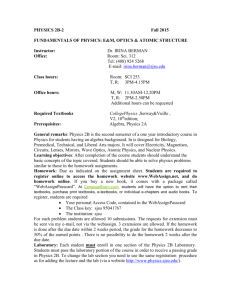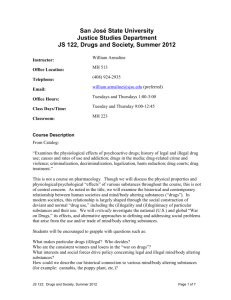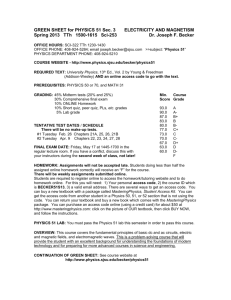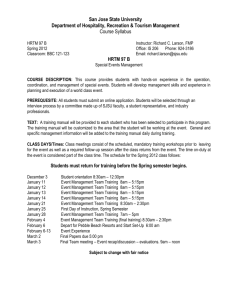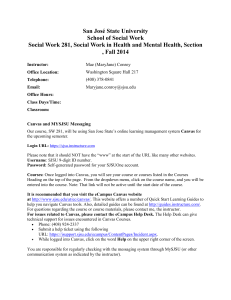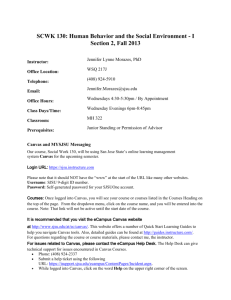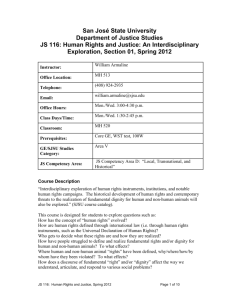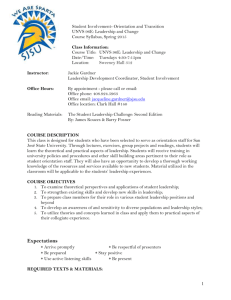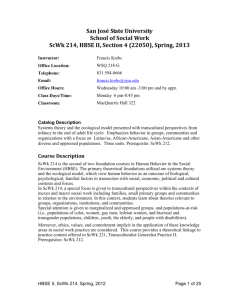Social Work 131-HUMAN BEHAVIOR IN THE SOCIAL
advertisement
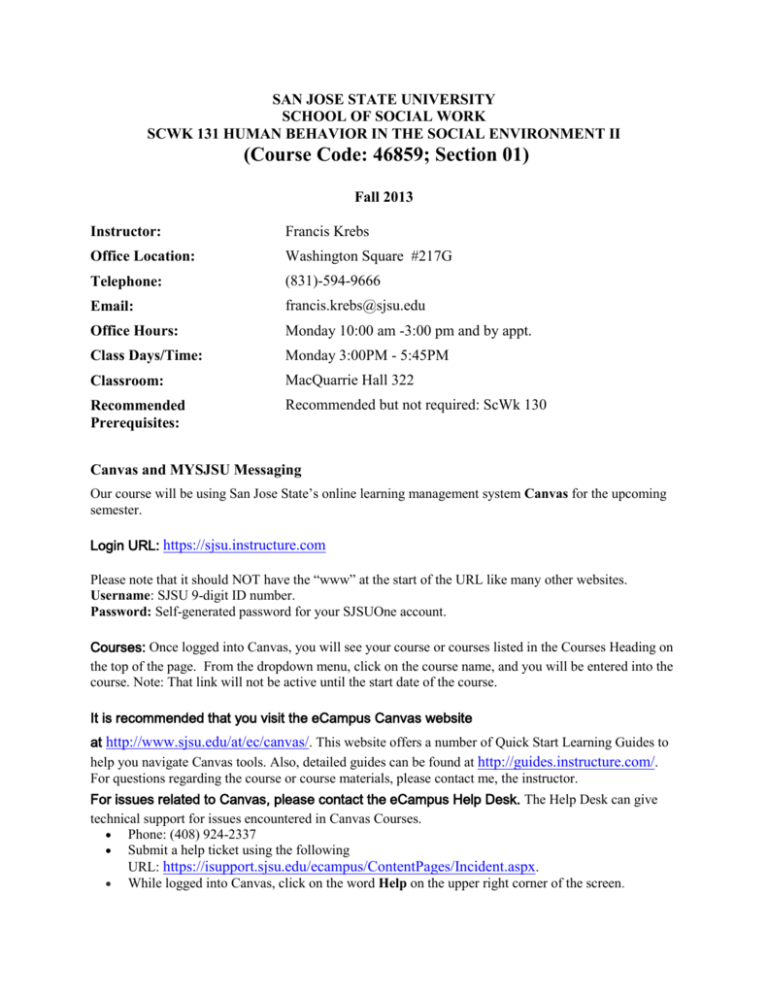
SAN JOSE STATE UNIVERSITY SCHOOL OF SOCIAL WORK SCWK 131 HUMAN BEHAVIOR IN THE SOCIAL ENVIRONMENT II (Course Code: 46859; Section 01) Fall 2013 Instructor: Francis Krebs Office Location: Washington Square #217G Telephone: (831)-594-9666 Email: francis.krebs@sjsu.edu Office Hours: Monday 10:00 am -3:00 pm and by appt. Class Days/Time: Monday 3:00PM - 5:45PM Classroom: MacQuarrie Hall 322 Recommended Prerequisites: Recommended but not required: ScWk 130 Canvas and MYSJSU Messaging Our course will be using San Jose State’s online learning management system Canvas for the upcoming semester. Login URL: https://sjsu.instructure.com Please note that it should NOT have the “www” at the start of the URL like many other websites. Username: SJSU 9-digit ID number. Password: Self-generated password for your SJSUOne account. Courses: Once logged into Canvas, you will see your course or courses listed in the Courses Heading on the top of the page. From the dropdown menu, click on the course name, and you will be entered into the course. Note: That link will not be active until the start date of the course. It is recommended that you visit the eCampus Canvas website at http://www.sjsu.edu/at/ec/canvas/. This website offers a number of Quick Start Learning Guides to help you navigate Canvas tools. Also, detailed guides can be found at http://guides.instructure.com/. For questions regarding the course or course materials, please contact me, the instructor. For issues related to Canvas, please contact the eCampus Help Desk. The Help Desk can give technical support for issues encountered in Canvas Courses. Phone: (408) 924-2337 Submit a help ticket using the following URL: https://isupport.sjsu.edu/ecampus/ContentPages/Incident.aspx. While logged into Canvas, click on the word Help on the upper right corner of the screen. You are responsible for regularly checking with the messaging system through MySJSU (or other communication system as indicated by the instructor). Catalog Description Theories and knowledge about families, groups, organizations, and communities from a systems perspective. The impact of discrimination, economic deprivation and oppression on populationsat-risk. Emphasis on the promotion of optimal health and well-being. Course Description This course examines in detail major social system influences on human development and behavior, culture, society, social class, community, organizations, small groups, and family. Careful consideration is given to the impact of gender, race, ethnicity and sexual orientation. Recommended prerequisite: SCWK 130, junior standing., Social Work majors only. Core Competencies and Practice Behaviors (Students Learning Objectives) Core Competencies The following competencies are realized through this course: 3. Apply critical thinking to inform and communicate professional judgments 4. Engage diversity and difference in practice 7. Apply knowledge of human behavior and the social environment Students Learning Objectives (SLOs) and Practice Behaviors for Competencies Upon completion of SCWK 131 students will be able to: 1. Understand theoretical foundations and conceptual frameworks used in social work that examine the reciprocal relationships between human behavior and social environment. PB: 7 (a) (Theoretical framework) 2. Utilize conceptual frameworks that inform the process of assessment and intervention. PB: 7 (a) (Theoretical framework) 3. Explain and analyze the impact of major social systems (culture, society, social class, communities, organizations, small groups, and families) on human behavior and analyze the influence of social stratification, race, gender, sexual orientation, and ethnicity as it relates to human behavior. PB: 4 (a,c) (Diversity) 4. Identify the factors that contribute to prejudice, discrimination, and oppression and analyze the consequences of discrimination and oppression in the context of social work values and ethics. PB: 4 (a,c) (Diversity) 5. Apply critical thinking to major theories and concepts used for understanding human behavior in social work practice. PB: 3 (a) (Critical Thinking); PB: 7 (b) (Theoretical framework – critique and apply) 6. Demonstrate effective, professional oral and written communication skills in application of theory. PB: 3 (c) (Critical Thinking) Required Texts/Readings Textbook 1) Kirst-Ashman, K.K. (2010). Human Behavior, Communities, Organizations, and Groups in the Macro Social Environment: An Empowerment Approach. (3rd .ed), Belmont, CA: Wadsworth Publishing. ISBN-10 0-495-60374-0; ISBN-13 978-0-495-60374-0 2) Human Behavior and the Social Environment: Families and Groups. Thomson Custom Solutions ISBN: 0495206970. (This book, which contains several chapters from two different books, has been customized for this course and is only available at the Spartan Bookstore). Library Liaison For assistance in the library go to the King Library Reference Desk (2nd floor; 808-2100) and/or utilize the Social Work Research Guide available at http://libguides.sjsu.edu/scwk. The Social Work Library Liaison is: Teresa Slobuski, Teresa.Slobuski@sjsu.edu or 408-808-2318. Classroom Protocol Students are expected to arrive on time, participate in class discussions and exercises, and to be attentive to lectures and discussions. It is important to be courteous and respectful to ones peers as well as to the instructors. Students are asked to refrain from using cell phones, earphones or other devices. Dropping and Adding Students are responsible for understanding the policies and procedures about add/drops, academic renewal, etc. Refer to the current semester’s Catalog Policies section at http://info.sjsu.edu/static/catalog/policies.html. Add/drop deadlines can be found on the current academic calendar web page located at http://www.sjsu.edu/academic_programs/calendars/academic_calendar/. The Late Drop Policy is available at http://www.sjsu.edu/aars/policies/latedrops/policy/. Students should be aware of the current deadlines and penalties for dropping classes. Information about the latest changes and news is available at the Advising Hub at http://www.sjsu.edu/advising/. Assignments and Grading Policy Your grade in this course will be based on your presentations, written work, tests and participation as follows: Assignments Points Course Student Learning Exam – I (take home) Exam – IIa (take home) Exam – IIb (in class) Exam – III (take home) Class Participation 25 20 10 35 15 Objective/Competency (SLO) SLO: 1, 2, 3, 6, SLO: 1, 4, 6, SLO: 1, 2, 3, 4, 5, 6, SLO: 1, 2, 3, 4, 5, 6, SLO: 1, 2, 3, 4, 5, 6, Incomplete Grade Request & Late Submission of Assignments: Incomplete grades will only be given for cases of documented illness, or personal/family crisis. All assignments are expected to be turned in on time. Failure to do so for any reason (except documented and reasonable extenuating circumstances) will result in a lowered grade. You are expected to communicate by email and phone with the instructor if you have extenuating circumstances that require accommodation. Take home exams will be considered late after 12:00 p.m. the day they are due. Any assignment turned in at the office need to be date stamped by office staff. For in-class exams: if an emergency arises, examinations may only be made up, by appointment, during the week of the scheduled examination. Cheating on the exam will result in an F on the exam. APA Format and Writing Requirements: All papers must follow current American Psychological Association (APA) format guidelines (6th edition) with the following exceptions: the use of running heads is optional. All papers must use standard, 12-point fonts (e.g., Times Roman) and be free of typographical, formatting, spelling, and content errors, as the quality of the writing will be evaluated as part of the grade for all written assignments. Be sure to carefully review and edit all drafts prior to submission. All ideas, quotes, and information taken or derived from other sources must be appropriately cited and referenced in accordance with APA rules. Grading The grading and evaluation distribution for the class is outlined below. Percentage. 97-100%. 93-96%. 90-92%. 87-89%. 83-86%. 80-82%. 77-79%. Assignments: Grade. A+ A. AB+ B. BC+ Percentage. 73-76%. 70-72%. 67-69%. 63-66%. 60-62%. Below 60%. Grade. C. CD+ D. DF.. All Assignments are expected to be turned in on time. Failure to do so for any reason (except documented and reasonable extenuating circumstances) will result in a lowered grade. 1) Take-Home Exam: (25 points): The take-home examination covering the material on families will be based on case studies. Students are expected to apply the material learned in class and from the book to one or more case scenarios. Details will be given in class. 2) Take Home Exam: (20 points): The take home exam will cover material on groups and organizations. Students are expected to apply the material learned in class and from the book to case scenarios. Details will be given in class. 3) In class Exam: (10 points): The in-class examination will cover on groups and organizations. The exam will consist of word identifications, multiple choice, and essay questions related to readings, lectures, films and class exercises. If an emergency arises, examinations may only be made up, by appointment, during the week of the scheduled examination. Cheating on the exam will result in an F on the exam. 4) Take Home Exam: (35 points): The take home exam will cover material on groups, organizations, and communities. Students are expected to apply the material learned in class and from the book to case scenarios. Details will be given in class. University Policies Academic integrity Your commitment as a student to learning is evidenced by your enrollment at San Jose State University. The University’s Academic Integrity policy, located at http://www.sjsu.edu/senate/S07-2.htm, requires you to be honest in all your academic course work. Faculty members are required to report all infractions to the office of Student Conduct and Ethical Development. The Student Conduct and Ethical Development website is available at http://www.sa.sjsu.edu/judicial_affairs/index.html. Instances of academic dishonesty will not be tolerated. Cheating on exams or plagiarism (presenting the work of another as your own, or the use of another person’s ideas without giving proper credit) will result in a failing grade and sanctions by the University. For this class, all assignments are to be completed by the individual student unless otherwise specified. If you would like to include your assignment or any material you have submitted, or plan to submit for another class, please note that SJSU’s Academic Policy S07-2 requires approval of instructors. Campus Policy in Compliance with the American Disabilities Act If you need course adaptations or accommodations because of a disability, or if you need to make special arrangements in case the building must be evacuated, please make an appointment with me as soon as possible, or see me during office hours. Presidential Directive 97-03 requires that students with disabilities requesting accommodations must register with the Disability Resource Center (DRC) at http://www.drc.sjsu.edu/ to establish a record of their disability. University Resources Student Technology Resources Computer labs for student use are available in the Academic Success Center located on the 1st floor of Clark Hall and on the 2nd floor of the Student Union. Additional computer labs may be available in your department/college. Computers are also available in the Martin Luther King Library. A wide variety of audio-visual equipment is available for student checkout from Media Services located in IRC 112. These items include digital and VHS camcorders, VHS and Beta video players, 16 mm, slide, overhead, DVD, CD, and audiotape players, sound systems, wireless microphones, projection screens and monitors. SJSU Peer Connections The Learning Assistance Resource Center (LARC) and the Peer Mentor Program have merged to become Peer Connections. Peer Connections is the new campus-wide resource for mentoring and tutoring. Our staff is here to inspire students to develop their potential as independent learners while they learn to successfully navigate through their university experience. Students are encouraged to take advantage of our services which include course-content based tutoring, enhanced study and time management skills, more effective critical thinking strategies, decision making and problem-solving abilities, and campus resource referrals. In addition to offering small group, individual, and drop-in tutoring for a number of undergraduate courses, consultation with mentors is available on a drop-in or by appointment basis. Workshops are offered on a wide variety of topics including preparing for the Writing Skills Test (WST), improving your learning and memory, alleviating procrastination, surviving your first semester at SJSU, and other related topics. A computer lab and study space are also available for student use in Room 600 of Student Services Center (SSC). Peer Connections is located in three locations: SSC, Room 600 (10th Street Garage on the corner of 10th and San Fernando Street), at the 1st floor entrance of Clark Hall, and in the Living Learning Center (LLC) in Campus Village Housing Building B. Visit Peer Connections website at http://peerconnections.sjsu.edu for more information. SJSU Writing Center The SJSU Writing Center is located in Room 126 in Clark Hall. It is staffed by professional instructors and upper-division or graduate-level writing specialists from each of the seven SJSU colleges. Our writing specialists have met a rigorous GPA requirement, and they are well trained to assist all students at all levels within all disciplines to become better writers. The Writing Center website is located at http://www.sjsu.edu/writingcenter/about/staff/. SCWK 131. SPRING 2013. COURSE SCHEDULE This schedule is subject to change with fair notice. I will announce any changes in class. Table 1 Course Schedule Week 1 Date Aug 26 Topics, Readings, Assignments, Deadlines Overview Of The Course & Theoretical, Conceptual & Empirical Foundations (PB 3a:Critical thinking; PB 7b, theoretical framework ) Critical thinking: Evaluating theories, observation and research in the knowledge building process Ecological Theory Overview of major social systems (culture, society, social class, communities, organizations, small groups, and families) Influence of social stratification, race, gender, sexual orientation, and ethnicity as it relates to human behavior Readings: Kirst-Ashman – Text, Chapters 1 & 12 – Intro to human behavior in the macro social environment, diversity, & populations at risk. 2 Sept. 9 Families (PB 7a & b, theoretical framework; PB: 4a & c Diversity) Systems Theory Family life cycle Developmental sequences Eco-map/sociogram of families (Include culture, ethnicity, GLBT issues, gender in discussion of eco-map) Readings: Chapter 3, Goldenberg – Gender, culture, ethnicity factors in family functioning. (From 2nd Text – custom-ordered) 3 Sept. 16 Families (PB 7a & b, theoretical framework; PB: 4a & c, Diversity) Family Dynamics – Structure and Communication Stressful Life Events: Divorce & Death -- Impact on the family Readings: Chapters 9 & 10, Goldenberg – Structural Model; Strategic Model. (From 2nd Text – custom-ordered) 4 Sept. 23 Families (PB 7a & b, theoretical framework; PB: 4 a & c, Diversity; PB: 3 a & c, Critical Thinking) Strengthening Families: Risk & Protective Factors Week Date Topics, Readings, Assignments, Deadlines Evidence-Based Strategies Case Study VIDEO: Families First Readings: Kumpfer (1999). Strengthening America’s Families. Exemplary Parenting & Family Strategies for Delinquency Prevention. U.S. Dept. of Justice, Office of Juvenile Justice and Delinquency Prevention. (Available on course web-page). 5 Sept. 30 Families Case Studies and Exam Review 6 Oct. 7 TAKE HOME EXAM ON FAMILIES DUE IN CLASS TODAY Group Dynamics (PB 7a & b, theoretical framework; PB: 4 a, Diversity) Decision-making in groups 7 Oct.14 Readings: TBA Group Dynamics (PB 7a & b, theoretical framework; PB: 4 a, Diversity) Types and functions of groups Group dynamics – Social Facilitation, Loafing, Polarization, Group Think Group Facilitation – Role of the Facilitator Readings: Forsyth, Chapters 4 & 5. (From 2nd Text – customordered) Kirst-Ashman – Text, Chapters 10 & 11 8 Oct. 21 9 Oct. 28 Group Dynamics (PB 7a & b, theoretical framework); PB: 4 a & c, Diversity) Stages of group development Roles VIDEO: Twelve Angry Men Readings: Forsyth, Chapter 6. (From 2nd Text – custom-ordered) Take home exam on Groups. Organizations (PB 7a & b, theoretical framework; PB: 4 a, Diversity) Organizational Theories & Perspectives Internal & External Environments Traditional Organizations –Bureaucracies Week Date Topics, Readings, Assignments, Deadlines Competition vs. Collaboration Readings: Kirst-Ashman – Text, Chapters 5, 6, & 7 Take home exam due at beginning of class. 10 Nov. 4 Organizations (PB 7a & b, theoretical framework; PB: 4 a, Diversity) Understanding organizational structure and performance – Logic Models Empowerment in Organizations Readings: Kirst-Ashman – Text, Chapters 8 & 9 11 12 Nov.18 Nov.25 Test Review IN-CLASS EXAM – Organizations VIDEO: Holding Ground Communities (PB 7a & b, theoretical framework; PB: 4 a & c, Diversity) Theories & Perspectives on Community Readings: Kirst-Ashman – Text, Chapters 2 & 3 Wellman, B. (2001). Computer Networks as Social Networks. Science, 293, 2031-2034. (Available on course web-page) Smith, M. (2005). Social Capital. (Available on course web-page) 13 Dec. 2 Communities (PB 7a & b, theoretical framework; PB: 4 a & c, Diversity) Neighborhood Development Readings: Kirst-Ashman – Text, Chapters 4 Institute of Medicine (2000). Why Neighborhood And Community Conditions May Matter For Young Children. Chapter in a Report titled: “From Neurons to Neighborhoods: The Science of Early Childhood Development.” (Available on course web-page). University of Pittsburgh Office of Child Development (n.d.). “Where Children Grow Up: Understanding How Neighborhoods Effect Child Outcomes.” (Available on course web-page). Week 14 Date Dec. 9 Topics, Readings, Assignments, Deadlines Synthesis: - Families, Groups, Organizations, and Communities Exam Review & Summary of Course Course Evaluation. TAKE HOME EXAM ON COMMUNITIES DUE IN CLASS TODAY


